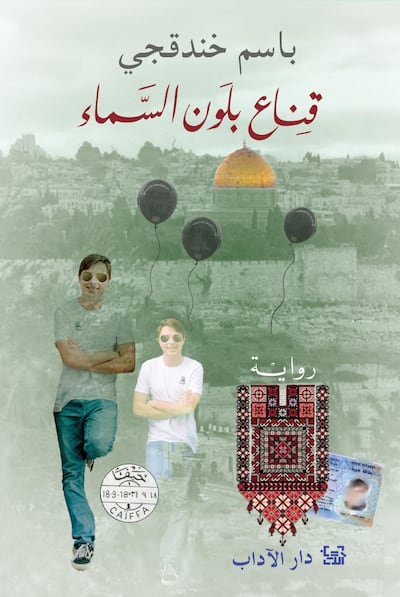The imprisoned Palestinian author Basim Khandaqji has been named the winner of the International Prize for Arabic Fiction for his 2023 novel A Mask, the Colour of the Sky.
Published by Lebanon’s Dar Al Adab, the book was named the winner of the $50,000 prize at a ceremony in Abu Dhabi on Sunday. In addition to the prize money, funding will be made available for an English translation.
Born in Nablus in 1983, Khandaqji was arrested on terrorism charges by Israeli authorities in 2004 and convicted of planning and participating in a bombing at Tel Aviv’s Camel Market that killed three people and injured dozens more.
He is serving three life sentences in an Israeli prison.
Rana Idriss, the founder of Dar Al Adab, received the award in Abu Dhabi on the author’s behalf.
“Basim would like to thank the organisers and judging panel of the Ipaf awards. He would also like to thank his family who have been his source of strength throughout the nearly 21 years that he has been imprisoned, particularly his brother Yousef Khandaqji, his brother and partner in life,” Idriss said on receiving the award.
Yousef Khandaqji was in the audience to watch the announcement at the event held at Abu Dhabi’s Fairmont Bab Al Bahr.
A Mask, the Colour of the Sky follows the life of Nur, a Palestinian archaeologist living in a refugee camp in Ramallah. On finding the blue identity card belonging to an Israeli citizen in the pocket of an old coat, Nur takes on the life of the card’s namesake in an attempt to understand life behind the security fence.
Syrian writer Nabil Suleiman, known for his epic four-part 2012 novel Orbits of the East and chairman of this year’s Ipaf judging panel, hailed the work for its multi-layered narrative.
“A Mask, the Colour of the Sky fuses the personal with the political in innovative ways. It ventures into experimenting with new narrative forms to explore three types of consciousness – that of the self, the other and the world,” he said as part of the winner’s announcement.
“It dissects a complex, bitter reality of family fragmentation, displacement, genocide and racism.
“The strands of history, myth and the present day are delicately woven together in a narrative that pulses with compassion in the face of dehumanisation and is stirred by a desire for freedom from oppression, both at an individual and societal level. A Mask, the Colour of the Sky declares love and friendship as central to human identity above all other affiliations.”

Prof Yasir Suleiman, chairman of the award’s board of trustees, highlighted the novel’s narrative sweep.
“An archaeology of victimhood emerges, and the trauma of modern Palestine unravels,” he said. “After careful scene setting, the novel gathers pace quickly, ensnaring the reader in its galloping storylines and unexpected subtle humour.”
Khandaqji’s work is one of two Palestinian novels shortlisted for the Ipaf, the other being The Seventh Heaven of Jerusalem by Osama Al Eissa.
“I didn’t expect my novel to be shortlisted, because of the number of eminent literary names on the longlist and also the quality of the novels, demonstrating the technical range and fascinating topics which are characteristic of the modern Arabic novel,” Al Eissa told the Ipaf website on receiving his nomination.
“I received a call from my publisher Khaled Al Nasiri congratulating me. We were both overwhelmed by thoughts about what was happening in Gaza, and I was happier about Basim Khandaqji being shortlisted [than about my novel being on the list]. He is someone dear to me.”
A Mask, the Colour of the Sky is Khandaqji’s fourth novel and part of a series of works, including poetry collections, released while imprisoned.
In January, the Ipaf website ran an interview with a person identified as Khandaqji’s brother. At the time of publication, he said the family had no communication with the author for four months.
“The novel took six months to write, while the research side took several years in difficult and complicated circumstances, as Basim was inside various prisons, moving from one prison to another because of the arbitrary measures taken by the prison service administration,” he said.
“As far as inspiration goes, Basim is inspired by ancient and contemporary Palestinian history. He based his novel on his reading of research and studies about Palestinian history, including eyewitness accounts of some of the prisoners inside and outside prisons, especially the Palestinians living inside Israel.”
Updated: April 28, 2024, 5:48 PM






